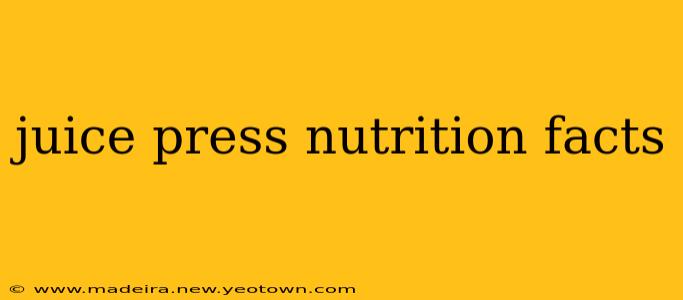Let's be honest, the vibrant colors and enticing aromas of freshly pressed juice are enough to make anyone's mouth water. But beyond the delicious taste, lies a world of nutritional benefits that make juice cleanses and regular juice consumption a popular choice for health-conscious individuals. This article dives deep into the nutritional facts surrounding juice presses and their incredible impact on your well-being. Prepare to be amazed by the power packed into every sip!
What are the Nutritional Benefits of Juicing?
The nutritional benefits of juicing are numerous and varied, depending heavily on the fruits and vegetables used. Generally, juicing allows you to consume a large quantity of produce in a convenient and palatable way. Think of it as concentrated nutrition! Many fruits and vegetables contain essential vitamins, minerals, antioxidants, and phytonutrients – all vital components for maintaining a healthy body. However, it's crucial to remember that juicing doesn't retain all the nutrients present in whole fruits and vegetables. Fiber, for example, is largely removed during the juicing process.
What are the potential drawbacks of juicing?
While juicing offers many benefits, it's not without potential drawbacks. The lack of fiber in juice can lead to blood sugar spikes, making it less satiating than eating whole fruits and vegetables. This can, in turn, lead to increased hunger and potential weight gain if not carefully managed within a balanced diet. Furthermore, some juices are surprisingly high in natural sugars, especially those made from fruits. It's always wise to choose a mix of fruits and vegetables to balance the sugar content. And of course, commercially produced juices often contain added sugars, preservatives, and artificial ingredients – something to watch out for carefully when making your selections.
What nutrients are in a typical Juice Press juice blend?
The nutrient content of a Juice Press juice blend varies greatly depending on the specific combination of fruits and vegetables used. However, we can examine some common ingredients and their nutritional contributions. For instance, a green juice blend might contain kale, spinach, and celery, all excellent sources of vitamins A, K, and C, as well as various minerals and antioxidants. A juice featuring beets will offer nitrates, known to improve blood pressure and vascular health. Citrus fruits add Vitamin C and antioxidants, while carrots provide beta-carotene, a precursor to Vitamin A. It's crucial to check the specific nutritional information for the individual Juice Press blends you're considering, as formulations can change.
Are Juice Press juices good for weight loss?
This is a complex question. While the high nutrient density of juice can contribute to a healthy diet that supports weight loss, juice alone isn't a magic bullet. The removal of fiber can lead to increased hunger, potentially negating the weight-loss benefits. The high sugar content in some juice blends can also contribute to weight gain if not carefully monitored. For effective weight loss, juice should be part of a balanced diet that also includes whole foods, regular exercise, and a focus on calorie control. Juice cleanses are often touted for weight loss, but the results are usually temporary and water weight related rather than sustained fat loss. A healthy, sustainable lifestyle is key to long-term weight management.
How many calories are in a typical Juice Press juice?
Calorie counts for Juice Press juices vary significantly based on the ingredients. A smaller juice might contain around 150-200 calories, while larger, more nutrient-dense blends can reach 300-400 calories or more. Always check the nutritional information provided by Juice Press for the specific juice you’re planning to consume to make informed decisions about your daily calorie intake.
Is Juice Press juice pasteurized?
Many commercial juice companies pasteurize their products to extend shelf life. However, Juice Press emphasizes freshness and typically uses High-Pressure Processing (HPP) as a safer alternative to traditional pasteurization. HPP maintains the nutritional value and flavor of the juice while effectively eliminating harmful bacteria. Check their website or contact them directly to confirm their current processing methods.
This detailed exploration of juice press nutrition hopefully clarifies the complex relationship between juice, nutrition, and overall health. Remember that moderation and a balanced lifestyle are key to reaping the greatest benefits.

